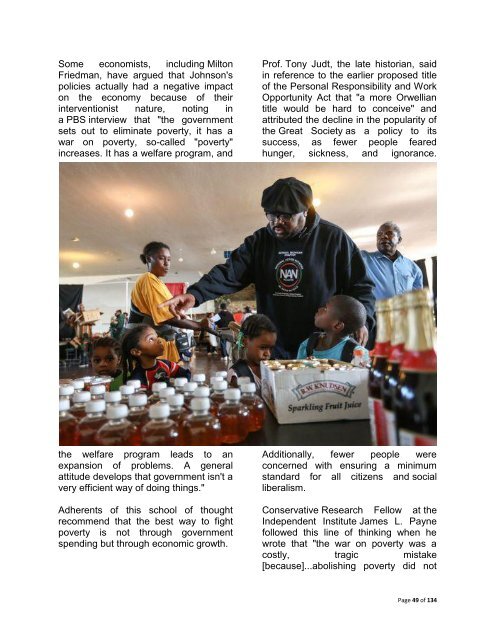Concentrated Poverty
Concentrated Poverty
Concentrated Poverty
You also want an ePaper? Increase the reach of your titles
YUMPU automatically turns print PDFs into web optimized ePapers that Google loves.
Some economists, including Milton<br />
Friedman, have argued that Johnson's<br />
policies actually had a negative impact<br />
on the economy because of their<br />
interventionist nature, noting in<br />
a PBS interview that "the government<br />
sets out to eliminate poverty, it has a<br />
war on poverty, so-called "poverty"<br />
increases. It has a welfare program, and<br />
Prof. Tony Judt, the late historian, said<br />
in reference to the earlier proposed title<br />
of the Personal Responsibility and Work<br />
Opportunity Act that "a more Orwellian<br />
title would be hard to conceive" and<br />
attributed the decline in the popularity of<br />
the Great Society as a policy to its<br />
success, as fewer people feared<br />
hunger, sickness, and ignorance.<br />
the welfare program leads to an<br />
expansion of problems. A general<br />
attitude develops that government isn't a<br />
very efficient way of doing things."<br />
Adherents of this school of thought<br />
recommend that the best way to fight<br />
poverty is not through government<br />
spending but through economic growth.<br />
Additionally, fewer people were<br />
concerned with ensuring a minimum<br />
standard for all citizens and social<br />
liberalism.<br />
Conservative Research Fellow at the<br />
Independent Institute James L. Payne<br />
followed this line of thinking when he<br />
wrote that "the war on poverty was a<br />
costly, tragic mistake<br />
[because]...abolishing poverty did not<br />
Page 49 of 134

















